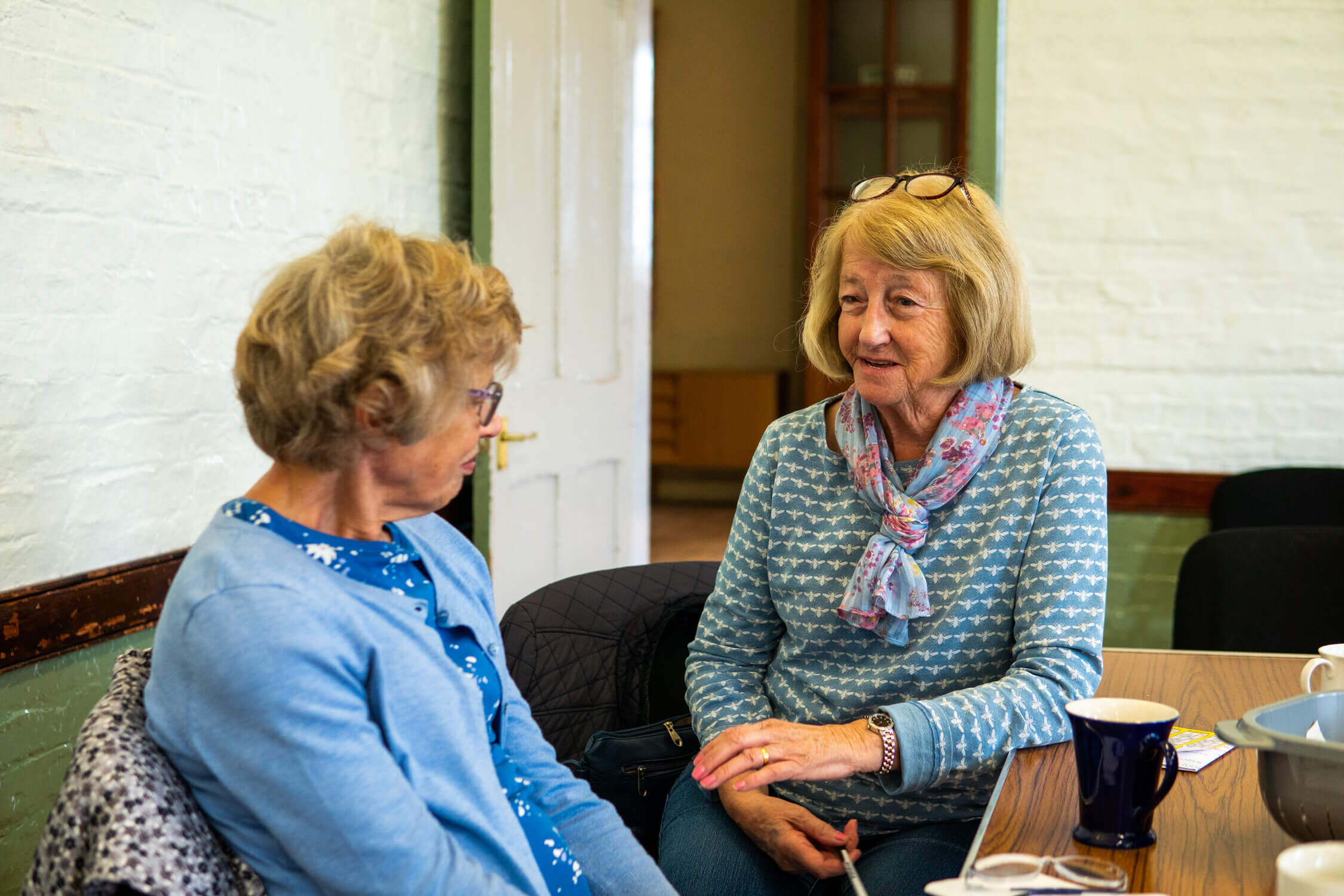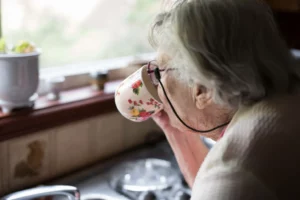Caring for elderly parents with dementia – caregiver tips
Tags
Dementia Care
According to recent research, one in two UK adults feel they’ll have no choice but to care for a parent when they become too frail to live by themselves. It’s a huge responsibility that can have overarching implications in many areas of your life – from your lifestyle and where you live to your career. If you’re caring for a parent with dementia then there can be an additional emotional toll too, as symptoms can cause behaviour and personality changes that you may find upsetting.
If you’re caring for a parent with dementia, we’ve shared some top tips to help you create the right environment, navigate difficult situations, and take care of your own mental and physical health.
Why can taking care of an ageing parent be so stressful?
Caring for a parent can be an emotional whirlwind. First and foremost, after years of being looked after and supported by a parent, having to switch roles and become their caregiver can be difficult to get your head around. You may feel resentment towards your parents for the impact they’ve had on your life, or feel afraid of what’s around the corner. However you feel, your emotions are valid, don’t beat yourself for feeling a certain way, and don’t be afraid to seek support for how you’re feeling.
Some other common emotions family caregivers feel include –
- Grief for how a parent used to be and missing the way things were
- Feeling irritable and having little patience
- Embarrassment, particularly if your parent is behaving differently, or if you need to provide personal care such as washing or helping them to the toilet
- Guilt about taking time for yourself, or not doing things right
- Loneliness or social isolation, due to having less opportunity to spend time with others, or people who understand exactly what you’re going through
- Frustration at your situation, or at yourself if you’re finding caregiving difficult
There are often other factors at play too. Taking care of someone takes a lot of time, energy and resources. If you’ve had children, you may have had a conversation beforehand about the changes you’d need to make to support your decision. For example, you or your partner may have stopped working in order to look after the children full-time, or you may have needed to move into a more appropriate property – both of which are significant life changes.
Caring for a parent often takes the same amount of effort and planning. However, because this happens later in life you may not have the energy or financial means you once did. And, if a parent’s health suddenly declines, you may not have a lot of time to put a plan in place.
What to consider when looking after an relative with dementia
Dementia is a challenging condition. There are lots of things to consider before taking on a caring role for a loved one alone.
Did you know –
It’s estimated that around 57 million people worldwide have dementia, and this is expected to triple to 153 million people by 2050.
The right environment
Consider where the right place is for your parent to receive care – and always involve them in this decision as much as possible. People with dementia may wish to stay at home, and find the familiarity a comfort. Some also find that staying in their own home can help reduce confusion or cognitive impairment when compared to moving someplace new.
However, consider how dementia friendly their home is, some things to think about include
- Can they get from room to room safely?
- Do they have uneven or slippery floors?
- Do they have a modern oven and hob that is easy to use and has been checked by an electrician or gas engineer? Or, would it be safer to remove the oven and just have a microwave in the kitchen?
- Can they find their way to the bathroom easily? Do you need to install signs?
- Can you use contrasting colours within their decor to help distinguish between different items or areas?
- If they need to move in with you, will your home be just as suitable to their needs?
Creating a routine
Routine can help minimise certain dementia symptoms and behaviour, as it helps them understand what to expect and how to interpret or respond to that situation. This helps them to continue doing daily tasks themselves, for as long as possible.
However, just because a parent with dementia can do some things themselves, they’re still likely to need a helping hand or prompt. If you’re going to be providing care, it’s important to think realistically about how you can fit into their routine and support their daily life. Will you be able to get them up and dressed before you go to work? What happens if you get stuck in traffic and don’t make it to their house in time to help them with dinner? And is your situation likely to change in the future that could impact your availability for providing long-term care?
If you are sharing caring responsibilities with other family members or friends then it may be a good idea to create a schedule or calendar that you can all view and update. You may also wish to agree and put everyone’s responsibilities in writing.
Safety
Certain types of dementia, such as vascular dementia, can cause mobility issues or problems with balance and coordination. Some people may also get confused about what time of day it is and try to leave the house at night. Some important safety considerations may include the following –
- Speaking to your parent’s medical professionals to understand their specific risks and how you can make their home safer
- Investing in a monitoring system such as security cameras around the home, or a wearable GPS tracker in case they leave their home and get lost
- A personal alarm so they can call for help in an emergency.
People with dementia may wander. Our head of clinical, Alexis Cable, has shared some top tips to help manage this behaviour and keep a loved one safe.
Respite care
Everyone needs a break now and then, so before you become stressed and worn down by the responsibilities of caring, book yourself a holiday or give yourself even just a few hours a week to do something you enjoy.
There are a number of arrangements you can make to ensure your parent is looked after while you’re away. From weekly day centres and dementia cafes, to asking a friend or family member to step in, or arranging a form of professional care.
It’s often a good idea to create a contingency plan for what happens if you’re temporarily unable to provide care for some reason. When building your plan think about who you trust to provide care in your absence, and what type of care your parent is likely to accept.

How do you set boundaries with a parent with dementia?
Tune into your own feelings and needs
It’s all too easy to become lost in the role of carer. Making sure that your loved one is happy, healthy and well-fed can mean losing track of your own needs. Most carers have to hold down some form of a job, even if only part-time, and many still have school-age children at home to look after too. This can place even more stress on the management of day-to-day life for all concerned.
A major feature of caring is putting other people’s needs above your own. For short periods, this is doable, but over time, you can quickly find that your own needs and feelings are constantly on the back burner, which can really impact your mental health.
You may find the following useful –
- Talk to your own GP. They’ll be able to help you protect your mental health, and can register you as a carer. This is really important as it can often include free annual health checkin, free flu jabs, greater flexibility when booking appointments, and access to additional support designed to make your caring role a little easier.
- Joining carers UK. As well as offering a huge range of free resources on emotional and financial support on their website, you can also become a free member and join their active online community, get notified of the latest resources, and access exclusive discounts and giveaways.
- Reading stories of people who have been in your position. The Dementia Support Forum and Mumsnet, can be good places to learn from others and feel less alone in your role as a caregiver. If you’re considering professional care but are struggling with handing over responsibility to someone new, Elder has a selection of real life stories from people who have been in your position.
Make a plan and set your parameters
Many of us ‘fall’ into becoming carers as soon as it becomes apparent that one or both of our parents require regular assistance with day-to-day living. You need to assess your options and discuss them with other family members and friends to find a workable solution for your particular needs.
Arranging Power of Attorney is an important step that you should take sooner rather than later. Many elderly people fall prey to con artists who can trick them out of their life savings, so keep an eye out for unusual financial transactions on their bank account. People with dementia can become confused about money, so having the ability to take control of finances puts you in a good position to avoid losses.
Outlining when you’re available to care — and when you need to focus on other priorities is essential. If professional help is off the table, ask other family members if they could take turns in taking your parent out for the day, or come to visit and spend time chatting. Perhaps you have a brother or sister who could ask your parents to stay for a week or two, giving you some much-needed space? Examine all the options, and don’t be afraid to ask for help.
And remember, if you can’t do something that’s being asked of you, don’t be afraid to say no and voice your concerns with others.
Consider care at home
You may feel that putting your parent into a care home is the only alternative open to you. You can ask your local authority for help, and they will do a free care assessment of the type of support that your parent could receive, along with a financial plan of assistance if that is appropriate to your circumstances.
Even if you and your loved one don’t qualify for government assistance, you could still opt for your parent to receive in-home care from a private company specialising in providing elderly care services. Care at home services provide anything from a couple of hours’ support once or twice a week, through to 24/7 dementia care from a dedicated live-in carer.
Employing a full-time caregiver gives your parent the chance to form a relationship with someone who will also become a friend and companion to them. Having someone on hand around the clock means that they can continue to enjoy a high standard of independent living yet with all the benefits of having someone to help with shopping, cooking, social events and pastimes whenever they need.
Communicate clearly
Ideally, you want to make sure to involve your parent in any conversations about their future, and while this can be difficult in the later stages of dementia if a parent still has the capacity, it’s a crucial step towards finding a solution that works for everyone.
While these conversations may be difficult, they are necessary. Zoe Feldwick, an Integrative Therapeutic Counsellor and member of the British Association of Counsellors and Psychotherapists, has shared her advice on establishing healthy communication and discussing difficult later-life topics with family.
How can caregivers overcome sleep problems?
We asked Channel 4 sleep expert Stephanie Romiszewski about the impact of poor sleep, and how caregivers can break unhealthy sleep cycles.
Read more about dementia

Dementia care – how do I pay for it?
Dementia Live-in Care: How Do I Pay for It? If your loved one is living with dementia, it can be difficult to work out

Types of dementia
Common types of dementia Every dementia journey is different, and not everyone will experience the same symptoms. However, understanding the different types of dementia

What are the signs of dementia in women?
Did you know women have a greater risk of developing dementia over their lifetime than men? 600,000+ women in the UK are currently living

Dementia and sundowning – advice for caregivers
Dementia care – what is sundowning? Sundowning – sometimes referred to as ‘late-day confusion’ – is a symptom that causes those living with dementia

Discrimination and dementia
Overcoming discrimination and stigma can be a huge challenge for those living with dementia. We’ve looked at some of the common situations where people

Recognising the signs of frailty in someone with dementia
By understanding and recognising frailty, you can help a person with dementia to access the right care, reduce the risk of ending up in